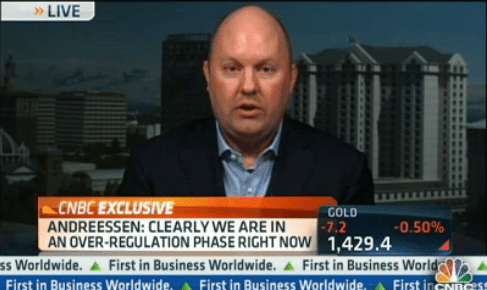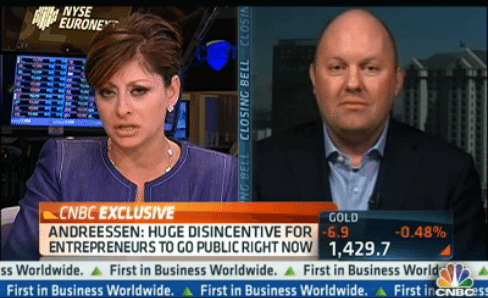 Over Regulation Has Challenged Public Markets, Will Crowdfunding Resurrect These Markets or Will Over Regulation Reign Supreme?
Over Regulation Has Challenged Public Markets, Will Crowdfunding Resurrect These Markets or Will Over Regulation Reign Supreme?
Recently venture capitalist, tech entrepreneur and industry soothsayer, Marc Andreesen was interviewed on CNBC in an piece entitled “We are Living Through a Tech Depression“. His talking points were about the decline in public markets and he shared some startling facts about the decline in publicly traded companies:
In 1997 there were 8,800 public companies
In 2012 there were 4100 public companies
Andreesen went on to note that Private Markets are doing fine. The wealthy have the ability and access to invest in start up companies. Andreesen and his Venture Capitalist brethren have been awarded great opportunity to participate in the growth in some amazing companies by engaging in early stage investments. These types of investments are not available to the masses today.
Of course not all investments are successful and VCs live by a rule that only a few of their investments will ever generate compensatory returns – but have we decided, as a society, to strip the risk out of public markets? It would appear so.
 Massive market corrections such as the DotCom crash and the Great Recession – amongst other high profile examples of corporate malfeasance – have emboldened politicians to decry the improprieties existing in our public markets.
Massive market corrections such as the DotCom crash and the Great Recession – amongst other high profile examples of corporate malfeasance – have emboldened politicians to decry the improprieties existing in our public markets.
To save us from ourselves regulations have showered down from Capitol Hill: Sarbanes Oxley, Dodd – Frank, Reg FD and the list goes on. Add in a boom in shareholder litigation to top it off. It seems our elected officials believe there is never an issue so trite that cannot be improved by some wide ranging legisltion.
But markets act as they should. They react to the environment in which they exist. When politicians build walls market forces look for alternatives. In the case of capital formation for entrepreneurs it means you do not take your company public for as long as you can manage it. Perhaps never. And why should you? The price to adhere to the byzantine morrass of regulations associated with public companies has created a cost structure that only the largest companies can endure. This is a huge disincentive for companies to go public. Politicians have decided they want to kill risk – but in doing so they are killing growth.
The advent of crowdfunding has created an opportunity for those of the “non-accredited” class to capture higher risk adjusted returns. In the regulatory environment today, entrepreneurs head straight for the Bootstrap/Angel/VC path – with investment crowdfunding this can change as it disruptions established methods of capital formation. If regulators allow investment crowdfunding to flourish it most certainly will. If it is smothered by over regulation, our economy – and the country as a whole – will have missed a unique opportunity. Entrepreneurs should be emboldened by the sprouting success in the UK and other countries regarding the success of Investment Crowdfunding. Regulators should be tempered by the empirical evidence available to date.
Risk is inherent in any investment and it should be. Any individual that can understand elements of risk and risk adjusted returns should be allowed to make their own decision as to how they invest their own money. The war on public markets should end today and this capital renaissance should begin with investment crowdfunding.

